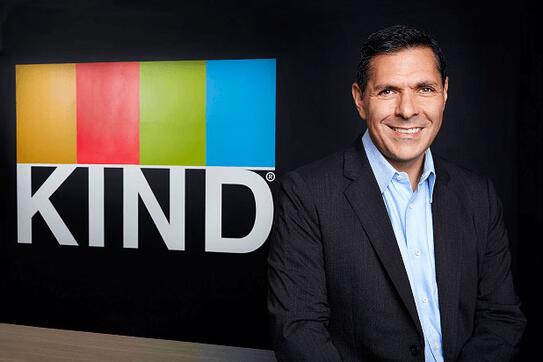"Nobody is perfect," stated Daniel Lubetzky during a speech recently given at Columbia Business School to an engaged audience of students and alumni. But everyone can live by certain values that connect us and guide us to be responsible citizens who create a future that’s fair and equitable.
"Kindness, respect, curiosity, compassion and courage" are these values, he said. And finally, he added, integrity. "Having integrity means not only doing the right thing but doing the right thing when no one is watching."
Lubetzky shared these remarks as part of his acceptance of The 2023 Botwinick Prize in Business Ethics awarded annually by the Sanford C. Bernstein & Co. Center for Leadership and Ethics. The Prize, established by the late Benjamin Botwinick, BS ’26, and his wife, Bessie, is presented to an individual who exemplifies the highest standard of ethical leadership across the disciplines. Lubetzky, who embodies the model of values-based leadership that CBS strives to impart on every student, joins a prestigious list of past winners, including such figures as Indra Nooyi, former Chairman and CEO of PepsiCo, Matthew McCarthy, CEO of Ben & Jerry’s, Rose Marcario, former CEO of Patagonia, and Kenneth Frazier, chairman and former CEO of Merck & Co.
A Conscientious Citizen
Lubetzky is best known as the founder of KIND Snacks, the brand of snack bars that prides itself on being wholesome, tasty, and good for the planet. But as he demonstrated in his acceptance speech and a subsequent candid conversation with Assistant Professor Rebecca Ponce de Leon, he is—before all else—a concerned, conscientious citizen.
Lubestky took this moment to share an urgent message with the audience: "We’re in crisis." He touched on the world’s polarization, climate change, and technology as threats to the values that underpin our collective sense of citizenship and community.
However, he also communicated a sense of hope rooted in the next generation of leaders. "When I look at all of you, I’m convinced that we are going to build a historic movement for good," he said. "We are fundamentally human beings. We’re endowed with this beautiful gift of being part of humankind."
The Strength to be Kind
Raised in a Jewish community in Mexico, Lubetzky is the son of a Holocaust survivor. His father’s legacy has shaped and inspired who he is as a businessperson as well as the companies and philanthropic organizations he has launched and led.
"My father was in the Dachau concentration camp and always said that he survived because of the kindness of strangers," he explained. That’s where the name for the snack company came from: "Being nice is good, but being kind takes strength. If you are nice you don’t bully, but if you’re kind you stand up to the bully. If you’re nice, you’re polite. But if you’re kind you provide people with honest feedback. We all should strive to be kind."
In addition to growing KIND Snacks into a multibillion-dollar global health and wellness company, Lubetzky’s earliest business ventures were predicated on his insistence that business acumen and humanistic leadership could help solve major societal issues. With that vision in mind, he founded Peaceworks and the One Voice Movement, which are dedicated to bridging divides and amplifying the voices of moderate Israelis and Palestinians. To ensure what happened to his father never happens again, he became an inaugural board member of the Anti-Defamation League, an organization established to stop the disparagement of the Jewish people and to secure justice and fair treatment to all. And, his newest endeavor, Starts With Us, brings together more than 200 diverse thought leaders who aim to cooperate across differences to solve the most pressing challenges of our time.
Through it all, though, Lubetzky has stayed humble and curious—aware of his own limitations and willing to question his own beliefs and biases. When asked what advice he’d offer to the leaders of tomorrow, that’s what he chose to elaborate on. "Every single one of us rationalizes their decisions to make them consistent with their economic interests," he said. "It’s close to unavoidable." It’s therefore incumbent for every future leader to appreciate that tendency and understand your own fallibility. Do the right thing from the very beginning to take the honorable path starting now.
